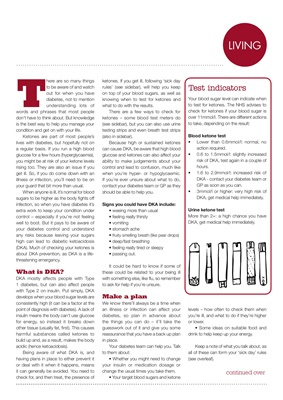
KITLIVING
T
here are so many things
to be aware of and watch
out for when you have
diabetes, not to mention
understanding lots of
words and phrases that most people
don't have to think about. But knowledge
is the best way to help you manage your
condition and get on with your life.
Ketones are part of most people's
lives with diabetes, but hopefully not on
a regular basis. If you run a high blood
glucose for a few hours (hyperglycaemia),
you might be at risk of your ketone levels
rising too. They are also an issue if you
get ill. So, if you do come down with an
illness or infection, you'll need to be on
your guard that bit more than usual.
When anyone is ill, it's normal for blood
sugars to be higher as the body fights off
infection, so when you have diabetes it's
extra work to keep your condition under
control - especially if you're not feeling
well to boot. But it pays to be aware of
your diabetes control and understand
any risks because leaving your sugars
high can lead to diabetic ketoacidosis
(DKA). Much of checking your ketones is
about DKA prevention, as DKA is a lifethreatening
emergency.
What is DKA?
DKA mostly affects people with Type
1 diabetes, but can also affect people
with Type 2 on insulin. Put simply, DKA
develops when your blood sugar levels are
consistently high (it can be a factor at the
point of diagnosis with diabetes). A lack of
insulin means the body can't use glucose
for energy, so instead it breaks down
other tissue (usually fat, first). This causes
harmful substances called ketones to
build up and, as a result, makes the body
acidic (hence ketoacidosis).
Being aware of what DKA is, and
having plans in place to either prevent it
or deal with it when it happens, means
it can generally be avoided. You need to
check for, and then treat, the presence of
continued over
ketones. If you get ill, following 'sick day
rules' (see sidebar), will help you keep
on top of your blood sugars, as well as
knowing when to test for ketones and
what to do with the results.
There are a few ways to check for
ketones - some blood test meters do
(see sidebar), but you can also use urine
testing strips and even breath test strips
(also in sidebar).
Because high or sustained ketones
can cause DKA, be aware that high blood
glucose and ketones can also affect your
ability to make judgements about your
control and lead to confusion, much like
when you're hyper- or hypoglycaemic.
If you're ever unsure about what to do,
contact your diabetes team or GP as they
should be able to help you.
Signs you could have DKA include:
• weeing more than usual
• feeling really thirsty
• vomiting
• stomach ache
• fruity smelling breath (like pear drops)
• deep/fast breathing
• feeling really tired or sleepy
• passing out.
It could be hard to know if some of
these could be related to your being ill
with something else, like flu, so remember
to ask for help if you're unsure.
Make a plan
We know there'll always be a time when
an illness or infection can affect your
diabetes, so plan in advance about
the things you can do - it'll take the
guesswork out of it and give you some
reassurance that you have a back up plan
in place.
Your diabetes team can help you. Talk
to them about:
• Whether you might need to change
your insulin or medication dosage or
change the usual times you take them.
• Your target blood sugars and ketone
Your blood sugar level can indicate when
to test for ketones. The NHS advises to
check for ketones if your blood sugar is
over 11mmol/l. There are different actions
to take, depending on the result:
Blood ketone test
• Lower than 0.6mmol/l: normal, no
action required.
• 0.6 to 1.5mmol/l: slightly increased
risk of DKA, test again in a couple of
hours.
• 1.6 to 2.9mmol/l: increased risk of
DKA - contact your diabetes team or
GP as soon as you can.
• 3mmol/l or higher: very high risk of
DKA, get medical help immediately.
Urine ketone test
More than 2+: a high chance you have
DKA, get medical help immediately.
Test indicators
levels - how often to check them when
you're ill, and what to do if they're higher
or lower.
• Some ideas on suitable food and
drink to help keep up your energy.
Keep a note of what you talk about, as
all of these can form your 'sick day' rules
(see overleaf).